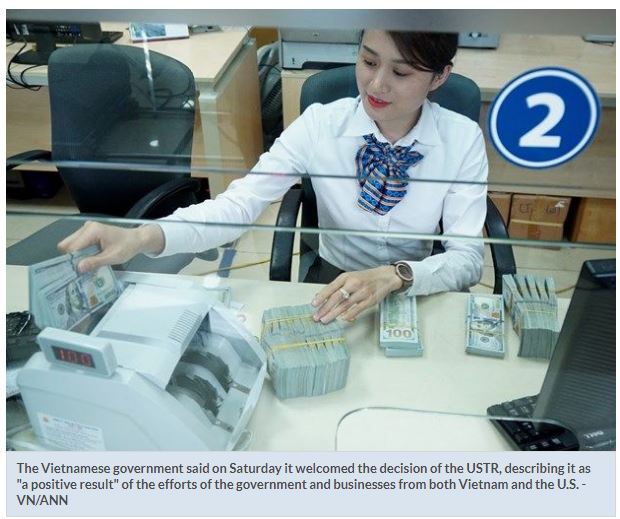US says Vietnam’s currency actions ‘unreasonable’ but holds off on tariffs
WASHINGTON: President Donald Trump’s administration said on Friday Vietnam’s actions to push down the value of its currency are “unreasonable” and restrict U.S. commerce, but did not take immediate action to impose punitive tariffs.
Releasing the results of its so-called Section 301 investigation into Vietnam’s currency practices, the U.S. Trade Representative’s (USTR) office said it would continue to evaluate all available options to correct the situation. That process will pass to the administration of Democratic President-elect Joe Biden, who is due to take office on Wednesday.
The U.S. Treasury Department in December labeled Vietnam a “currency manipulator” due to its growing trade surplus with the United States, its large global current account surplus and heavy foreign exchange market intervention to hold down the value of its dong currency.
Business groups and trade experts had feared this would lead to tariffs in the USTR investigation opened last October as a parting shot from the Republican Trump, who aggressively imposed tariffs during his four years in office.
The USTR said it consulted the Treasury Department on Vietnam’s exchange-rate policies.
“Unfair acts, policies and practices that contribute to currency undervaluation harm U.S. workers and businesses, and need to be addressed,” U.S. Trade Representative Robert Lighthizer said in a statement. “I hope that the United States and Vietnam can find a path for addressing our concerns.”
Vietnamese government said on Saturday it welcomed the decision of the USTR, describing it as “a positive result” of the efforts of the government and businesses from both Vietnam and the U.S.
“Vietnam will continue its efforts to open its market and enhance policy dialogues and strictly adhere to agreements between the two sides…to maintain a stable trade relation with a target for a balanced, sustainable and mutually-beneficial trade,” the government said in a statement.
The Section 301 investigation – named after a provision in a U.S. trade law – was the same tool that Lighthizer used to launch a sweeping tariff war against China, which has left punitive U.S. tariffs on $370 billion worth of annual Chinese imports and prompted many companies to shift supply chains out of China. Vietnam has been a major beneficiary of investment from those companies seeking to avoid U.S. tariffs on China.
The USTR’s decision to hold off on ordering tariffs against Vietnamese goods gives Biden’s nominee as trade representative, Katherine Tai, some breathing room in deciding how to approach Vietnam.
A spokesman for Biden’s transition team declined to comment on the USTR decision.
The Vietnamese government said its trade ministry and related agencies are willing to talk with the USTR to address the outstanding issues in the trade relations between the two countries to officially close the investigation. – Reuters


 Thailand
Thailand




